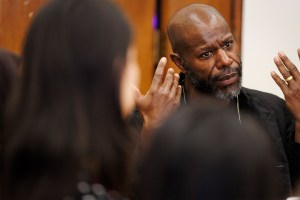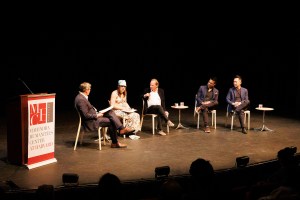Title IX talk shows knotty issues are alive and well
More than 30 years after its enactment, Title IX is still a topic of hot debate.
The United States law eliminated discrimination on the basis of sex for any educational program receiving federal funds and was largely responsible for revolutionizing the participation of women in college sports.
Historian and author Susan Ware ’73, Ph.D. ’78 was at the center of a Title IX discussion last week (Oct. 18) at the Radcliffe Institute for Advanced Study’s Schlesinger Library. Ware, an expert on 20th century American women, is a fellow at the Charles Warren Center for Studies in American History at Harvard.
She came to Radcliffe to talk about her paper “A Sporting Chance, Title IX’s First Decade,” which examines the law’s development during the feminism of the 1970s. It is part of a larger work in progress that Ware hopes will become the book “A Sporting Chance: Billie Jean King, Title IX and the Revolution in Women’s Sports.”
The session was part of the 2007-08 Boston Seminar Series on the History of Women and Gender, co-sponsored by the Massachusetts Historical Society and the Schlesinger Library. For Ware, the discussion about Title IX’s origins and its lasting impact served as an informal brainstorming session to help her identify areas for further development in her work.
The author was in good company — in a room full of scholars interested in feminism and equal rights, many of whom were feminists themselves as well as athletes.
“At this point I’m not entirely sure how all these things are going to fit together and work, and what’s going to be the predominant balance,” admitted Ware. “I am especially eager to hear your reactions and comments … as I try to figure out how to move forward and really take this generally narrative story …[to a] higher level to really figure out what it all means.”
Eileen L. McDonagh A.M. ’66, Ph.D. 72, B.I. ’75, professor of political science at Northeastern University and fellow at Harvard’s Institute for Quantitative Social Science, agreed with Ware’s fundamental assumption that sports matter.
“It is an ‘arena,’ literally and figuratively,” said McDonagh, “where relationships between people are worked out and where these people represent not just the teams but they represent groups in society often measured in terms of their race, class, and sex.”
She disagreed slightly with Ware’s contention that Title IX reflects the “equal rights” sentiment of feminism in the 1970s. McDonagh, who is co-author with Laura Pappano of “Playing with the Boys: Why Separate Is Not Equal in Sports,” argued that the law never adequately addressed the separation of men and women in contact sports.
“Right from the very, very beginning of the implementation of Title IX there was a remarkable and, I think, pernicious [tacit] permission to allow sex segregation in contact sports” like football and wrestling, said McDonagh. She argued that acceptance was contrary to the way sex discrimination was being challenged in the ’70s.
“This just comes out of the blue,” she said. “There was no discussion of this of any sort [in the 1970s]; it wasn’t debated.”
Moderator Nancy F. Cott, the Jonathan Trumbull Professor of American History and director of the Schlesinger Library, questioned Ware’s decision to use the Association for Intercollegiate Athletics for Women (AIAW) as a sort of “heroine” in her narrative. The AIAW was created in the 1970s to develop opportunities for women in college sports.
Cott said the AIAW supported a separate structure for women’s sports, and the notion that women should not be competitive.
“There is a problem with that portrayal,” Cott said. By the end of the paper, she told Ware, “You are [arguing] against current pink and blue definitions of sports.”
Ware agreed and was ambivalent about AIAW’s role in her narrative but wanted to acknowledge the group’s importance. “I’m just trying to keep them in play,” she said.
In addition, Ware said she wants her work to highlight the varied feminist perspectives that were emerging during the ’70s and that still exist today. While many were pressing for equal participation and “sameness,” she said, others strongly held the notion that separate, “women only” spaces were critical. She emphasized the point with a personal anecdote.
“I do remember once being interviewed by the Boston Globe about should men be allowed to run in the Bonnie Bell [a women’s road race], and I had to say ‘Yes, they should be allowed to run,’ and then I said, ‘But I sure hope they don’t.’ It feels so good for women to be running together because they haven’t had that experience. They’ve always been marginalized.”
One member of the audience commented that sports are divided as deeply by race as they are by gender. Ware agreed and said she would make sure to take note.
“There is a way in which the liberal feminist story tends to be a white girls’ story,” she said. “I think that you’ve given me a caution that I need to make sure that I don’t really replicate that in my own work.”
The main point Ware said she hopes to drive home with her work is the notion of the long road still ahead for gender equality in sports.
“This segregation in sports makes us blind to how much men and women have in common. … [It’s] reinforcing one of the last places where you can really say, ‘All right, men are stronger and more important than women.’ … If we can encourage … a more gender-neutral approach to sports, you can’t say those things anymore.”




